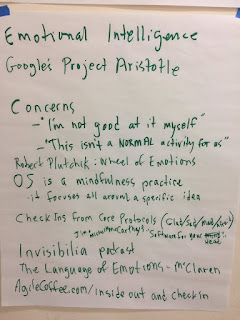What is busy about our job?
- managing people
- dealing with fires
- expectations
- herding cats
- overlapping priorities
- navigating conflict
What role do you have?
- developer / dev lead
- scrum master
- coach
- psychology practitioner
Why do we need to be present?
- to be authentic
- to attend to the needs of the group
- to help them "see the system"
- to maintain emotional balance
The parable about the sensei and the teacup: the student can not accept more tea until they first empty their cup.
Levels 1, 2 and 3 listening
Theory U
Practices
- Meditation:
- Do you use apps?
- guided: Headspace, podcasts
- timers
- time to meditate:
- morning & evening at home
- at work: find a time during the day (~10 minutes)
- start a meditation group at work, sync with Slack etc.
- Physical Activity
- walking / jogging
- biking to work
- yoga
Judith Blackstone (former dancer) has a useful practice model (?) - interview on podcast
Start the day with a Check In
Start the day with a Check In
- We ran a check in during this session (glad/sad/mad/afraid)
- Overview of the Core Protocol: Check In agilecoffee.com/ Inside Out (movie) and the Check-In core protocol
- includes overview of Plutchik's Wheel of Emotions
Emotional Intelligence is improved within the groups who practice.
See also Google's Project Aristotle for the value of Mindfulness on the job
- "I'm not good at this"
- the point of meditation isn't to have no thoughts, it's to notice when thoughts exist
- "This (meditation) is something that we normally don't do"
- there may be other activities that you currently do that also weren't "normal" when introduced
Open Space is a Mindfulness practice. It focuses the attention of the hive mind to a singular point
Invisibilia podcast (NPR)
The Language of Emotions (book) by Karla McCleran
The Mindful Coach (book) by Doug Silsbee




No comments:
Post a Comment